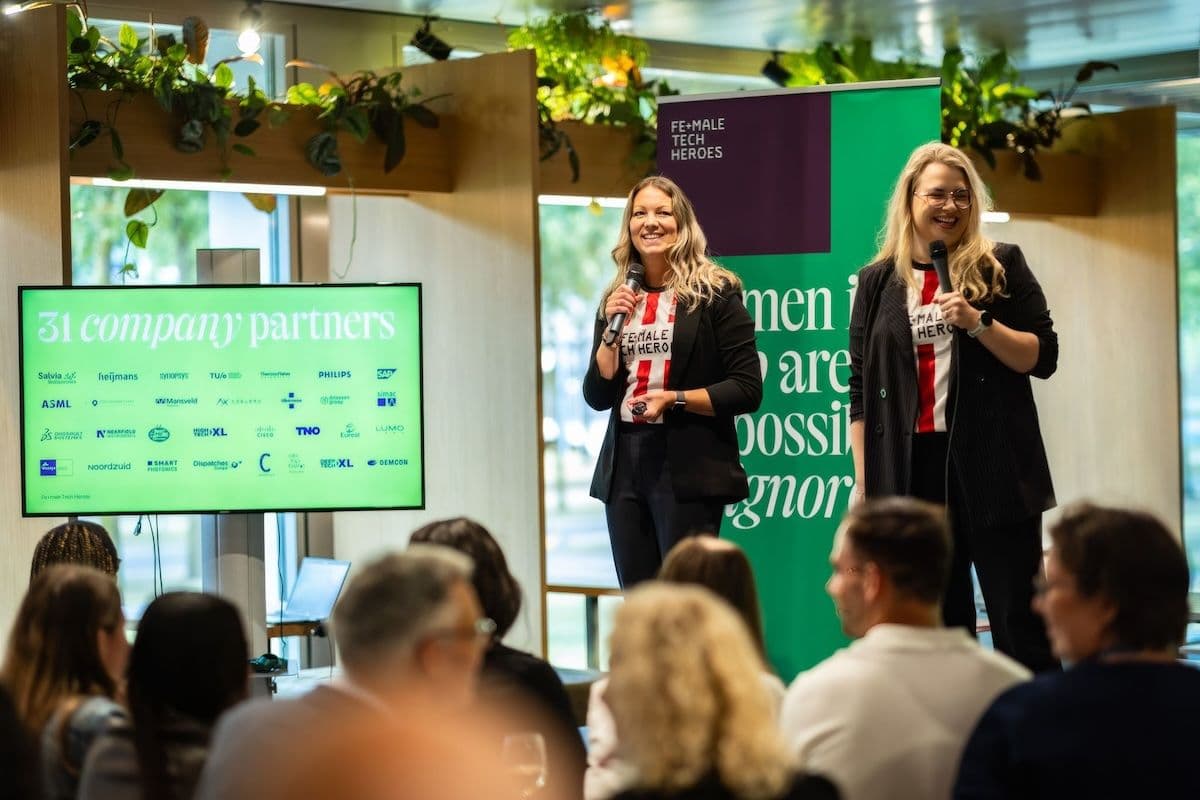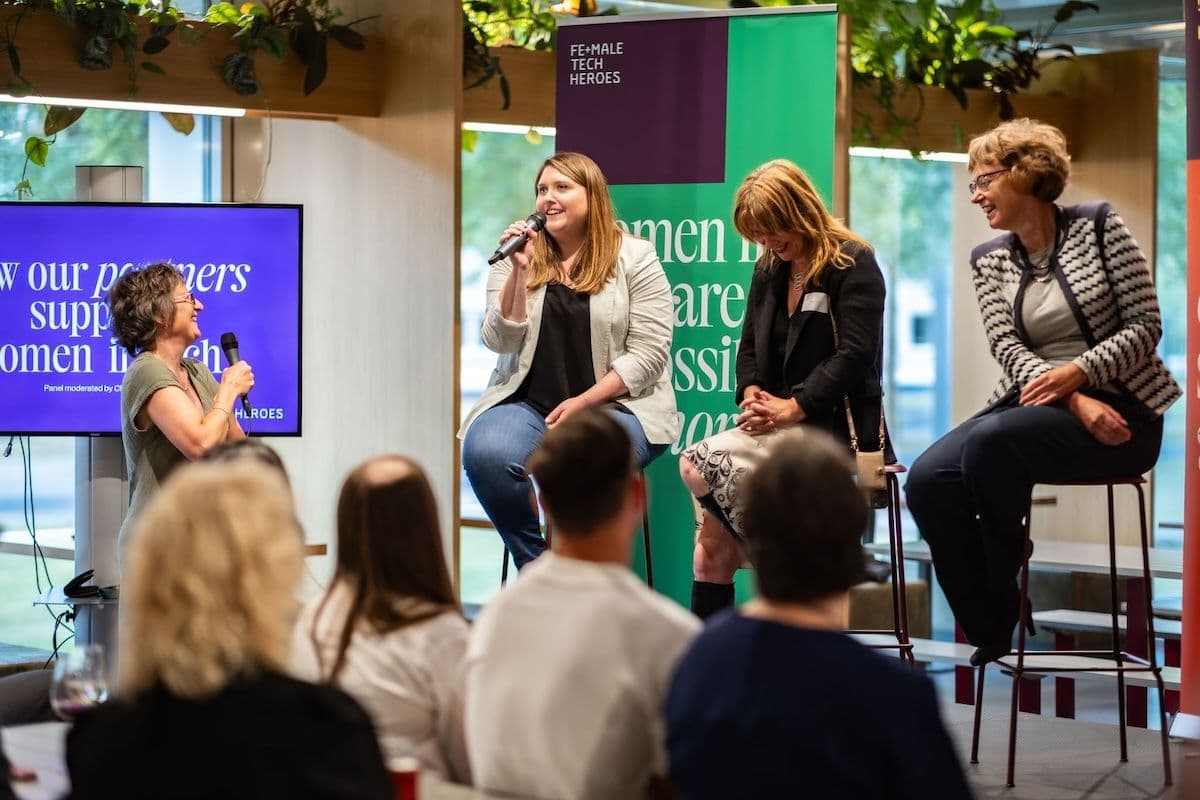Women rising in tech: Record applications and patent success
From startup support to international patents, women are increasingly shaping Europe’s innovation landscape. Still, many challenges remain.
Published on September 8, 2025

Fe+Male Tech Heroes
Bart, co-founder of Media52 and Professor of Journalism oversees IO+, events, and Laio. A journalist at heart, he keeps writing as many stories as possible.
Women are claiming more space in Europe’s innovation landscape. A record number of startups applied for the Women TechEU program this year, while Dutch women rank among the world’s top inventors in patent filings. Although there's still much to gain, these trends signal a decisive shift: female innovators are shaping the future of tech.
Europe is witnessing a steady but significant shift: women are taking up more space in the world of technology and innovation. The recent record-breaking numbers in the European Commission’s Women TechEU program and new data on women inventors in patent applications reveal that female innovators are no longer the exception. Instead, they are becoming a driving force behind a big part of Europe’s innovation power.
A record-breaking Women TechEU call
The European Innovation Council and SMEs Executive Agency (EISMEA) announced in late August that the fourth Women TechEU open call drew more than 700 applications from across Europe, an all-time high. The program supports deep tech startups founded or co-founded by women, offering funding, mentoring, and networking opportunities.
“The growing interest shows that female innovators are eager to scale their technologies and play a leading role in Europe’s digital and green transitions,” EISMEA wrote when presenting the figures.
Dutch sources confirm the trend. According to Neth-ER, which represents Dutch knowledge institutions in Brussels, the number of Dutch applications is also on the rise. “The appetite is there, and Dutch female founders are clearly seeing the added value of this European program,” Neth-ER stated.
For context, the Women TechEU initiative began in 2021 as a pilot with only 50 grants available. Since then, demand has soared. The fourth call marks a turning point, proving that Europe’s startup ecosystem is no longer ignoring the potential of women-led innovation.
From startups to patents
But the story goes beyond entrepreneurship. Women are also making their mark in one of the most formalized corners of the innovation system: international patent applications.
According to the Patent Cooperation Treaty Yearly Review 2025 from the World Intellectual Property Organization (WIPO), women inventors are appearing with growing frequency in filings worldwide. And the Netherlands is punching above its weight.
Patent attorney Marco Coolen highlighted the findings on LinkedIn: “In the Netherlands, women are strikingly often listed as inventors in international patent applications (PCT). Innovation is not a male-only domain, and that’s good news for our innovative strength!”
The World of Patents
Marco Coolen writes a weekly column on patents and intellectual property on IO+. Read all his work here.
The data back him up. In 37.7% of all Dutch PCT applications, at least one female inventor is named. This places the Netherlands in third position worldwide, behind China (51.9%) and the United States (39.6%). Countries like Turkey (36.9%) follow closely, while traditional innovation powerhouses such as Germany (23.9%) and Austria (18.1%) lag behind.
Examining all inventor names listed in Dutch PCT filings reveals that 18.3% are women. Their impact is especially strong in pharma, food chemistry, and organic fine chemistry - fields that have long relied on Dutch expertise.
Shaping the innovation narrative
These developments are more than just statistics; they reshape how innovation is perceived in Europe. For years, the tech world has faced criticism for being male-dominated, with women underrepresented in venture capital, research, and leadership positions. The recent surge in startup applications and patent listings suggests that this imbalance is being corrected, albeit slowly.
“Innovation is not a man’s thing”, Coolen emphasized. His words resonate with the Women TechEU results, which highlight that women are actively building companies at the cutting edge of artificial intelligence, sustainability, and health technologies.
For the European Commission, the message is clear: tapping into the full talent pool is not just about equality, it’s about competitiveness. As EISMEA put it, “If Europe wants to lead the global tech race, it cannot afford to leave half of its talent behind.”
The Dutch example
The Netherlands’ strong showing in patent data and its growing participation in Women TechEU reflect a broader national ecosystem that increasingly values inclusivity. The country’s innovation hubs, from Brainport Eindhoven to the Leiden Bio Science Park, are home to numerous female founders, researchers, and inventors pushing the boundaries of what’s possible.
Neth-ER stresses the importance of continuing this momentum. “Programs like Women TechEU do not just provide money; they offer visibility and networks that female founders have historically lacked,” the organization noted. “That visibility is crucial for inspiring the next generation.”
Talking about inspiration: the Fe+Male Tech Heroes network is making waves in the Brainport Eindhoven network. The organization recently held an event with its 31 partner organizations, "to honor the organizations and changemakers who are making women in tech impossible to ignore." The focus is on gender equality in the tech world and on representation that matters. "These companies do it not just because it’s the right thing to do but because hashtag#innovation depends on it."

Fe+Male Tech Heroes event
Beyond numbers
While the figures are promising, challenges remain. Women still make up less than one-fifth of all named inventors in Dutch PCT applications. Access to venture capital also remains skewed: women-led startups attract only a fraction of overall funding in Europe. This is also true for the annual Gerard & Anton Awards ceremony. Among the 110 former winners, only 12% have a female founder. Although the jury has dozens of candidates to choose from every year, the outcome remains heavily male-oriented. More Gerard & Anton award data here.
Yet the trajectory is encouraging. The record-breaking Women TechEU applications and the patent data together signal a tipping point. Europe’s innovation narrative is expanding to reflect a more diverse cast of protagonists, one where women are no longer guests but co-authors of the future.
